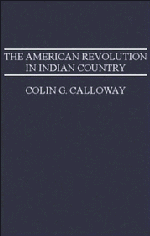Book contents
- Frontmatter
- Dedication
- Contents
- List of figures and maps
- Preface
- Acknowledgments
- Abbreviations
- Prologue New worlds for all: Indian America by 1775
- 1 Corn wars and civil wars: the American Revolution comes to Indian country
- 2 Odanak: Abenaki ambiguity in the North
- 3 Stockbridge: the New England patriots
- 4 Oquaga: dissension and destruction on the Susquehanna
- 5 Fort Niagara: the politics of hunger in a refugee community
- 6 Maquachake: the perils of neutrality in the Ohio country
- 7 Chota: Cherokee beloved town in a world at war
- 8 Tchoukafala: the continuing Chickasaw struggle for independence
- 9 Cuscowilla: Seminole loyalism and Seminole genesis
- 10 The peace that brought no peace
- Epilogue A world without Indians?
- Index
Preface
Published online by Cambridge University Press: 18 December 2014
- Frontmatter
- Dedication
- Contents
- List of figures and maps
- Preface
- Acknowledgments
- Abbreviations
- Prologue New worlds for all: Indian America by 1775
- 1 Corn wars and civil wars: the American Revolution comes to Indian country
- 2 Odanak: Abenaki ambiguity in the North
- 3 Stockbridge: the New England patriots
- 4 Oquaga: dissension and destruction on the Susquehanna
- 5 Fort Niagara: the politics of hunger in a refugee community
- 6 Maquachake: the perils of neutrality in the Ohio country
- 7 Chota: Cherokee beloved town in a world at war
- 8 Tchoukafala: the continuing Chickasaw struggle for independence
- 9 Cuscowilla: Seminole loyalism and Seminole genesis
- 10 The peace that brought no peace
- Epilogue A world without Indians?
- Index
Summary
As a British citizen living in the United States and studying the American Revolution, I frequently encounter widely divergent views on that event. Taking account of polar British and American perspectives can be a relatively simple matter. Defeat becomes victory; villains become heroes, and a tragic loss of empire translates into the triumphant birth of a new nation. However, taking account of the perspectives of people who do not fall so easily into Whig and Loyalist camps can be much more difficult. Where does one stand when the conventional positions on the Revolution offer no solid ground?
The American Revolution occupies a central place in American history, historiography, and mythology. Nevertheless, more than two hundred years after the event, the full story of many of the people who lived through it remains to be told. Recent historians have addressed this omission and investigated popular movements, the participation of African Americans, the experiences of women, the tales of local communities, and so on, to get a better sense of what was going on backstage in revolutionary America while the two Georges and their generals acted out their historic roles on center stage. The political upheaval and social ferment of the times involved much more than throwing off the imperial authority of Great Britain, and was not confined to the cities of the eastern seaboard. Historians have looked to the peripheries of revolutionary America to examine those people who invaded Indian lands in defiance of first imperial and then federal authority, who challenged or ignored the control of eastern elites, and who protested the distribution of rewards in postrevolutionary society or questioned the dominant society's vision of a new republic.
However, with few exceptions, revolutionary revisionism and recognition of the far-reaching nature of the American Revolution has not yet embraced American Indians. In general, historians of the Revolution have not been particularly interested in Indians, and scholars of Indian history have not paid much attention to the Revolution.
- Type
- Chapter
- Information
- The American Revolution in Indian CountryCrisis and Diversity in Native American Communities, pp. xi - xviPublisher: Cambridge University PressPrint publication year: 1995



